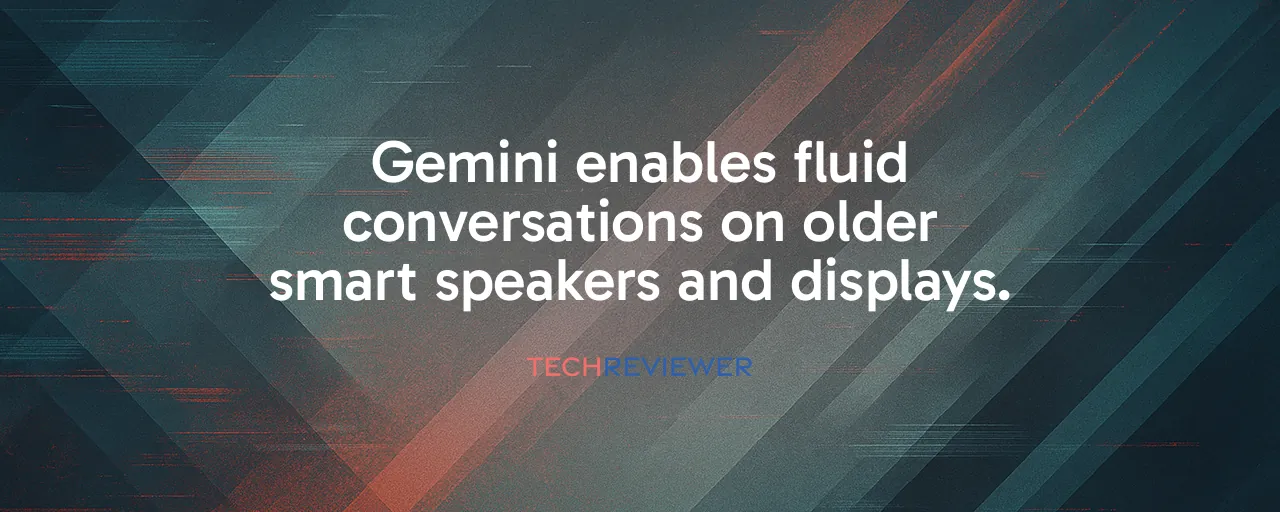Early Access Kicks Off the Switch
Google started pushing Gemini to select smart speakers and displays on October 28, 2025. U.S. users in the early access program see the change after opting in through the Google Home app. The familiar Hey Google trigger still handles basic requests like setting reminders or turning on lights. For longer exchanges, users can say Hey Google, let's chat to begin a continuous conversation with Gemini.
This setup keeps everyday controls simple while opening the door to detailed discussions. Users report handling homework questions or planning dinners in one flowing conversation. The system works on devices dating back to the original 2016 Google Home, showing how far on-device processing has come.
Conversations Flow Without Rigid Commands
Older Google Assistant needed exact phrases to avoid errors. Gemini picks up context mid-sentence and shifts topics smoothly. Someone might ask about a recipe, then follow up on ingredient substitutions, and the assistant stays on track without repetition.
Testing shows the model maintains accuracy through about ten exchanges before coherence drops. It parses compound instructions, such as dimming lights in specific rooms while skipping others. Ten new voice options add natural pauses and intonation, making responses feel less mechanical.
Amazon Alexa Case: Hardware Breadth Meets Simpler Smarts
Amazon built Alexa into a wide range of affordable devices, from basic Echo Dots to premium sound systems. This approach captured many entry-level buyers, with the assistant installed in 69.9 million North American units by 2025. Everyday controls work reliably, and integrations cover thousands of smart home brands.
Conversational depth lags, though. Alexa often requires structured commands and struggles with context across multiple turns. Users end up repeating details or breaking requests into steps. The ecosystem excels at quick actions but falls short on extended planning or tutoring sessions compared to Gemini's fluid handling.
Apple HomeKit Example: Privacy Focus Limits Scope
Apple processes Siri requests locally on devices whenever possible, keeping voice data off the cloud. This design appeals to users worried about recordings, especially after past incidents where companies reviewed audio clips. HomeKit ties tightly to iPhones and HomePods, accounting for approximately 18 to 20 percent of the U.S. smart home market.
The trade-off shows in flexibility. Siri handles basic home controls well but offers limited multi-turn depth or visual analysis from cameras. Ecosystem lock-in means fewer compatible third-party devices, and advanced automations demand manual setup through the Home app rather than natural language descriptions.
Subscription Layers Unlock Extra Capabilities
Core Gemini functions remain free, covering reminders, lights, and basic queries on all supported hardware. Gemini Live for ongoing talks requires a Google Home Premium subscription (at least the Standard plan at $10 monthly), though it works on devices dating back to 2016.
The Standard tier runs ten dollars monthly and includes automation suggestions along with thirty days of video history. Advanced level at twenty dollars adds AI summaries of camera footage and searchable clips. These options bundle with broader Google AI plans, creating recurring revenue where Assistant relied on hardware sales alone.
Privacy Trade-Offs in Daily Use
Gemini sends voice data to servers for processing, unlike Apple's on-device method. Recordings help improve models but raise questions about storage and access. Users control activity retention through Gemini Apps settings, with automatic deletion available for most interactions.
Camera features analyze footage for intelligent alerts, describing events in plain language. This convenience means more home data leaves the device. Surveys find approximately 63 percent of smart home consumers are concerned about data leaks, pushing Google to clarify policies and offer granular controls.
Lessons From the Two Approaches
Amazon's wide hardware net shows volume drives adoption, yet conversational gaps leave room for deeper systems. Apple's local processing builds trust but caps complexity and reach. Google combines cloud scale with backward compatibility, supporting nine-year-old speakers while adding multimodal smarts.
The real insight lies in balancing free basics against paid depth. Users accept subscriptions when value shows in daily routines, like generating grocery lists from meal plans. Interoperability through Matter helps, but proprietary AI layers keep ecosystems distinct. Future updates will likely extend context windows and integrate tighter with calendars or photos for proactive help.
